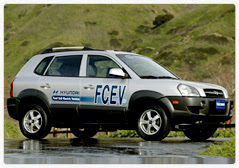 For the most part, I focus in on hybrid gas electric vehicles, but there are other hybrid vehicles out there. Like the Hyundai Tucson Fuel Cell Electric Vehicle (FCEV). Hyundai got a perfect score for its FCEV at Michelin's Challenge Bibendum, "an annual confab and competition among the world's automakers to promote sustainable mobility."
For the most part, I focus in on hybrid gas electric vehicles, but there are other hybrid vehicles out there. Like the Hyundai Tucson Fuel Cell Electric Vehicle (FCEV). Hyundai got a perfect score for its FCEV at Michelin's Challenge Bibendum, "an annual confab and competition among the world's automakers to promote sustainable mobility."
(Source: Challenge Bibendum: Hyundai Tucson FCEV). It beat out competition from Daimler, GM, Nissan and others.
The second generation Tucson FCEV from Hyundai has twice the range of the first range vehicle, the Sante Fe FCEV. It, unlike many fuel cell vehicles, is capable of starting at -20 degrees Celcius. It has a higher output fuel cell and a new lithium ion polymer battery.
The fleet testing phase of Hyundai is being supported by a grant from the DOE in partnership with ChevronTexaco Corp. and UTC Fuel Cells. Their primary goal is to "develop and demonstrate safe, convenient and reliable hydrogen-based distributed power generation, fuel cell vehicles and vehicle fueling infrastructure, and to educate key audiences about the use of hydrogen as a potential fuel for transportation and power generation."
From the Press Release:
About the Tucson FCEV
Built with lightweight, performance-boosting aluminum body components, the Tucson FCEV has a power-to-weight ratio similar to that of a conventional SUV. It also features low noise levels plus a roomy cabin that offers the same level of comfort and convenience as its gasoline-powered sibling.
Unlike the Santa Fe FCEV, the Tucson Fuel Cell program has been running on a parallel path with the conventional Tucson providing fully digitized engineering data from the earliest stages.
The Tucson FCEV's power plant has been relocated under the front hood, unlike its predecessor, which was integrated into the floorpan. In addition, the Tucson FCEV is capable of starting and operating in sub-zero temperatures.
Tucson FCEV's driving range has also been extended to 300 km (186 miles) thanks to its 152-liter (40-gallon) hydrogen storage tanks developed by Dynetek Industries Ltd. of Calgary, Alberta, Canada. By contrast, the Santa Fe FCEV lacks cold weather start capability and is equipped with a 72-liter fuel tank.
Marginally lighter than its predecessor, the Tucson FCEV also gets five more kW of power for a peak output of 80kW. Its maximum speed is rated at 150km/h (93 mph) compared to the Santa Fe's 124km/h (77 mph).
As in the Santa Fe FCEV, Hyundai has once again partnered with UTC Fuel Cells of South Windsor, Connecticut, which will supply the hydrogen-powered fuel cell. Enova Systems, of Torrance, Calif., has been tapped to provide the next generation hybrid-electric drive train, motor and control unit.
The Hyundai Tucson FCEV 152-V high voltage battery was co-developed by Hyundai Motor Co. and LG Chem in Seoul, Korea.
Tuesday, November 27, 2007
Tucson FCEV From Hyundai Achieves a Perfect Score
Subscribe to:
Post Comments (Atom)
 Follow me on Twitter
Follow me on Twitter

No comments:
Post a Comment
Comments posted on Hybrid Car Review will be moderated. Please avoid dropping links just for the sake of links. The comment will be deleted shortly after. Keep comments on topic and non-abusive. Thanks!